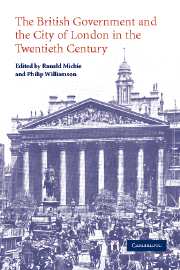Book contents
- Frontmatter
- Contents
- Notes on contributors
- Acknowledgements
- Conventions and abbreviations
- Introduction
- Part I The long perspective
- Part II Markets and society
- Part III Government and political parties
- Part IV The interwar period
- Part V 1945–2000
- 13 Keynesianism, sterling convertibility, and British reconstruction 1940–1952
- 14 ‘Mind the gap’: politics and finance since 1950
- 15 Domestic monetary policy and the banking system in Britain 1945–1971
- 16 The new City and the state in the 1960s
- 17 The Bank of England 1970–2000
- Select bibliography
- Index
17 - The Bank of England 1970–2000
Published online by Cambridge University Press: 04 July 2009
- Frontmatter
- Contents
- Notes on contributors
- Acknowledgements
- Conventions and abbreviations
- Introduction
- Part I The long perspective
- Part II Markets and society
- Part III Government and political parties
- Part IV The interwar period
- Part V 1945–2000
- 13 Keynesianism, sterling convertibility, and British reconstruction 1940–1952
- 14 ‘Mind the gap’: politics and finance since 1950
- 15 Domestic monetary policy and the banking system in Britain 1945–1971
- 16 The new City and the state in the 1960s
- 17 The Bank of England 1970–2000
- Select bibliography
- Index
Summary
When I first entered the Bank of England in 1968 there was an aphorism which senior management used quite frequently and approvingly, especially to young academic economists such as myself. This was Governor Cobbold's statement that ‘the Bank is a bank and not a study group’. As I understood the essence of this, it implied that the heart of the Bank then lay in its operational links with financial markets and institutions, and not in its contribution to macroeconomic analysis and policy. In 1968, as I shall describe, this was correct. By 2003 the main function of the Bank had become macroeconomic policy analysis, and decisions on interest-rate changes within the context of an inflation forecast undertaken by trained economists. In a sense the Bank has become an economic ‘study group’ rather than an operational bank, though that assessment needs, and will be given, considerable qualification.
Rather than starting, however, with an assessment of the Bank's recent role changes in the formulation of macro-monetary policy, though such changes have been major, I shall start with a discussion of the Bank's role in the maintenance of financial stability. Here there have been veritable revolutions, and, in my view, we have probably not yet reached a steady state. Then I shall turn to the Bank's (enhanced) role in macro-monetary policy-making. The third main section will cover the Bank's (diminished) role as a market operator in the City; and the final section will review the Bank's (again somewhat diminished) role in external affairs.
- Type
- Chapter
- Information
- Publisher: Cambridge University PressPrint publication year: 2004
- 1
- Cited by



